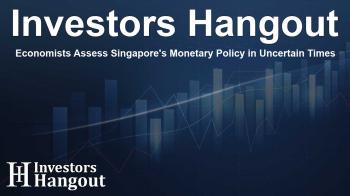Economists Assess Singapore's Monetary Policy in Uncertain Times

Understanding Singapore's Monetary Policy Landscape
SINGAPORE - As uncertainties loom over global economies, various economists are analyzing whether the Monetary Authority of Singapore will adjust its monetary policy parameters during an upcoming review. This assessment comes against the backdrop of potential changes in U.S. policies under the administration of President Donald Trump.
Poll Insights on Expected Monetary Changes
A recent survey conducted by Reuters, which included 12 economic analysts, highlighted a split opinion; six anticipate a loosening of the central bank's currency-based strategy to adapt to easing inflation and better-than-expected economic performance in the coming year, while the other half believes that the existing policy will remain unchanged.
Current State of Monetary Policy in Singapore
The Monetary Authority of Singapore (MAS) has maintained its current monetary stance since it last tightened policy in October 2022. This last adjustment was one of five consecutive changes aimed at addressing broader growth concerns. Previously, in March 2020, when the world was hit by the COVID-19 pandemic, the MAS had eased its monetary policy in anticipation of an impending recession.
Impact of U.S. Policies on Singapore
Some economists, such as Jonathan Koh from Standard Chartered, urge caution, emphasizing the importance of waiting to better understand the implications of the Trump administration's policies, which are expected to become clearer in the following months. Lee Yen Nee from Fitch Solutions echoes this sentiment, noting that Singapore's robust economic conditions allow the MAS to take a moment to carefully evaluate the global economic landscape.
Global Central Bank Trends
Globally, central banks are exhibiting a tendency towards gradual monetary policy shifts. For instance, the Federal Reserve took a step back from rate cuts recently, while inflation concerns arise from Trump’s proposed economic measures. The European Central Bank too has opted for a cautious approach, emphasizing the need to navigate through prevailing uncertainties.
Monetary Policy Mechanisms in Singapore
Uniquely, Singapore manages its monetary policy not through direct interest adjustments but by controlling the value of the Singapore dollar against a basket of major currencies. This mechanism is reflected through the Singapore dollar nominal effective exchange rate (S$NEER), which allows adjustments via the slope, mid-point, and width of the trading band.
Outlook for Inflation and Economic Growth
Maybank economist Chua Hak Bin perceives a potential for MAS to ease its monetary policy, given the current outlook for inflation appears more stable. Predictions indicate a gentler appreciation for the S$NEER slope. Furthermore, both core and headline inflation rates have recently moderated to below 2%, declining from their peak of 5.5% observed earlier in the year.
Projected Economic Performance
Looking ahead, the Singapore central bank projects core and headline inflation will range between 1.5% and 2.5% over the year. Analysts at Bank of America predict that the MAS will likely maintain its policy stance during the upcoming review yet indicate a dovish inclination towards future adjustments by the next scheduled assessment in April. The MAS has shifted to quarterly monetary policy announcements, a change from the previous semi-annual format.
Understanding Future Economic Indicators
As we approach the April meeting, economists anticipate clearer indicators regarding market adjustments and the subsequent impact of Singapore’s fiscal policies. Recognized as a key indicator of global economic performance, Singapore’s trade dynamics are significantly greater than its domestic output.
Conclusion: An Evolving Economic Dialogue
Overall, Singapore's growth outlook has notably exceeded expectations, with projected growth rates at 4% for 2024 after a slowdown in 2023, which saw growth at just 1.1%. Looking to 2025, the trade ministry has forecasted GDP growth between 1.0% and 3.0%. This ongoing analysis of Singapore's monetary policy not only reflects local economic conditions but also serves as a barometer for understanding broader global economic trends.
Frequently Asked Questions
What is the current outlook for Singapore's monetary policy?
Current expectations are split, with some economists anticipating a loosening of policy due to easing inflation and positive growth indicators.
How does Singapore manage its monetary policy?
Singapore controls its monetary policy through adjustments in the value of the Singapore dollar against a basket of major currencies, rather than using interest rates directly.
What are the inflation projections for Singapore?
Core and headline inflation are expected to stay between 1.5% and 2.5% for the year, indicating a stable economic environment.
Why is the MAS waiting to change its policies?
The MAS is waiting for greater clarity on global economic conditions and the impact of policies from the incoming U.S. administration before making adjustments.
What has been the recent economic growth rate for Singapore?
Singapore's economic growth is projected at 4% for 2024, a recovery following a slowdown in previous years.
About Investors Hangout
Investors Hangout is a leading online stock forum for financial discussion and learning, offering a wide range of free tools and resources. It draws in traders of all levels, who exchange market knowledge, investigate trading tactics, and keep an eye on industry developments in real time. Featuring financial articles, stock message boards, quotes, charts, company profiles, and live news updates. Through cooperative learning and a wealth of informational resources, it helps users from novices creating their first portfolios to experts honing their techniques. Join Investors Hangout today: https://investorshangout.com/
Disclaimer: The content of this article is solely for general informational purposes only; it does not represent legal, financial, or investment advice. Investors Hangout does not offer financial advice; the author is not a licensed financial advisor. Consult a qualified advisor before making any financial or investment decisions based on this article. The author's interpretation of publicly available data presented here; as a result, they should not be taken as advice to purchase, sell, or hold any securities mentioned or any other investments. If any of the material offered here is inaccurate, please contact us for corrections.
